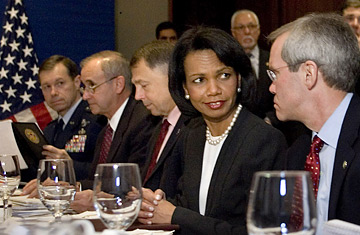
U.S. Secretary of State Condoleezza Rice talks with Assistant Secretary of State David Welch during a breakfast meeting with the Israeli Defense Minister in Jerusalem, March 27, 2007. Rice said today that Israeli and Palestinian leaders had agreed to meet every two weeks.
U.S. Secretary of State Condoleezza Rice landed in the Middle East with hopes of revving up peace negotiations, but she quickly realized that Israeli and Palestinian leaders were in no mood to talk to each other, or even to her. Her delegation found the Israelis sour and resistant, prone to finger-jabbing, and the Palestinians just as sullen.
By her departure from Tel Aviv on Tuesday, Rice was able to salvage some dignity for her mission, and to extract a bland promise from Abbas and Israeli Prime Minister Ehud Olmert that the two leaders would meet twice monthly for "confidence building." "I think perhaps the most important thing is they've agreed to talk together," she said in a press conference Tuesday morning. It was indeed a small step forward: since Abbas teamed up on March 17 in a Palestinian unity government with Islamic militants Hamas — considered by Israel, the U.S. and Europe to be a terrorist group — Olmert had taken to publicly insulting him for being "incapable of delivering the goods on any matter, big or small." The jeers made Rice's mission with the Palestinians nearly impossible.
But Abbas isn't the only one who can't deliver the goods. That remark might apply to Olmert himself. The latest opinion poll, conducted by Israeli TV channel 10, gave him a shocking 3% approval rating, and public dislike for the prime minister — who is widely blamed for not winning the war in Lebanon last summer against the Shi'ite militia Hizballah — could plunge even further if the Israeli attorney general in the coming weeks decides to investigate him for alleged corruption, as expected. A government inquest into the shortcomings of the military and political leadership during the Lebanon conflict will be released in April, possibly damaging Olmert's reputation even more. Israeli editorialists say making a deal with the Palestinians now could leave Olmert extremely vulnerable to political assault by the hardline Likud party.
Abbas is also tottering. He has no control over his Fatah militias in Gaza. His Fatah Central Committee now openly derides him as a stooge of the Americans and Israelis; and since Hamas took office in March, the Israelis, the Europeans the U.S. have boycotted the elected government of Prime Minister Ismael Haniyeh.
After six years of ignoring the Israeli-Palestinian dispute as a lost cause, the Bush Administration in recent months has renewed its interest in solving the conflict, largely as a way to rally moderate Arabs into supporting U.S. efforts to pacify Iraq and curtail Iran's radical aspirations in the region. To do so, Rice wants to show that the U.S. can shake off its pro-Israeli image among Arabs and prove that it can use its leverage with the Israelis to ease the Palestinians' suffering.
But even the simple task of coaxing the Israelis to talk with Abbas took some arm-twisting. Rice, an early riser who is usually in bed by 9 p.m., admitted that after an early dinner with Olmert, she and her aides stayed up well past her bedtime to hammer out a statement with the Israelis that would show some progress. The goal was to have something, however meager, that might strengthen the hand of the Saudis and other moderate Arabs who will be pushing to revive a 2002 peace initiative at Wednesday's Arab League summit in the Saudi capital Riyadh. The initiative promises peace between Arab states and Israel if it returns to its borders before the 1967 war and gives Palestinian refugees the right to return home.
Rice is known for her doggedness and hard work. Despite the current impasse between the Israelis and the Palestinians, she vows not to give up. Before heading back to Washington, she told reporters that peace negotiations in the Middle East would be a hard slog. "Very often what happens in international politics is that you put in the hard work up front — and then there's an opening," she said. "And all of a sudden you can move forward much more quickly because a lot of the groundwork has been laid." So far, the ground is still shifting treacherously under Rice's feet.
With reporting by Jamil Hamad/Ramallah
